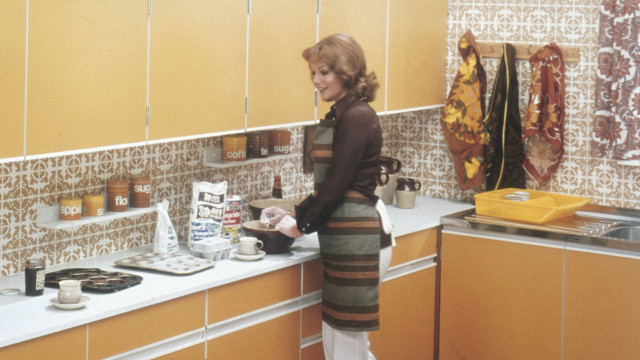































Habits that can influence your period - Menstruation is part of a natural cycle that most women experience. However, those period days can be incredibly painful and uncomfortable for some. But there are some daily habits that can make it easier to get through that week. Click here to learn more about the things you should and shouldn't do during your period.
© Shutterstock
0 / 32 Fotos
Sleeping - Sleeping is essential to the body's recovery process. According toBustle, women who go to bed later and sleep less will experience more premenstrual syndrome (PMS) symptoms.
© Shutterstock
1 / 32 Fotos
Changing tampons - If you use tampons, change them at least every four hours (depending on your menstrual flow). When a tampon is saturated with blood, it makes for an ideal environment for bacterial growth.
© Shutterstock
2 / 32 Fotos
Working out - The Iranian Journal of Nursing and Midwifery says that eight weeks of uninterrupted working out is enough to stop your from experiencing mood swings during your period.
© Shutterstock
3 / 32 Fotos
Calendar - Record the dates when you have your period so you can keep track of your cycle.
© Shutterstock
4 / 32 Fotos
Hot water bottle - A hot water bottle on the abdomen will relax the uterus and weaken the menstrual flow, This will reduce the pain caused by cramps.
© Shutterstock
5 / 32 Fotos
Relaxing playlist - Relaxing music can have a therapeutic effect during hormonal times.
© Shutterstock
6 / 32 Fotos
Food - One of the most efficient ways to control menstrual symptoms is through your diet. Be particularly aware of what you eat the week before you start your period.
© Shutterstock
7 / 32 Fotos
Banana - Bananas are rich in vitamin B6, magnesium, and potassium. These nutrients prevent water retention, which helps reduce the feeling of being bloated.
© Shutterstock
8 / 32 Fotos
Teas - Chamomile and ginger are especially recommended during your period. The first eases cramps and reduces anxiety, and the latter helps with nausea.
© Shutterstock
9 / 32 Fotos
Chocolate - Chocolate can reduce menstruation symptoms as it activates the regions of the brain associated with pleasure. Dark chocolate is your best ally!
© Shutterstock
10 / 32 Fotos
Almond butter - This nut butter is rich in fiber and protein, which balances blood sugar levels. This can be a healthier option when you crave sugar and fatty foods.
© Shutterstock
11 / 32 Fotos
Oranges - The calcium present in the fruit helps reduce PMS symptoms including those feelings of sadness and anxiety. Vitamin D regulates the functioning of the enzymes that release serotonin.
© Shutterstock
12 / 32 Fotos
Wholemeal bread - The magnesium found in wholemeal bread reduces muscle tension and the vitamins B and E help fight fatigue and depression.
© Shutterstock
13 / 32 Fotos
Watermelon - Naturally sweet foods will not only make you feel good but also fight diarrhea, which is pretty common during that time.
© Shutterstock
14 / 32 Fotos
Meat - Every month, the body expels a lot of iron through menstruation, so it is important to replace that nutrient. The best foods to do so are meats, dark-green vegetables, and legumes.
© Shutterstock
15 / 32 Fotos
Water - Excess fluid retention is one of menstruation's most common symptoms. The best way to fight it is to drink plenty of water.
© Shutterstock
16 / 32 Fotos
Yogurt - Dairy promotes healthy digestion and helps fight discomfort.
© Shutterstock
17 / 32 Fotos
Beans - Their high fiber content helps balance the digestion process.
© Shutterstock
18 / 32 Fotos
Omega-3 - Omega-3, found in oily fish like salmon, curbs the production of prostaglandin, the hormone responsible for cramps and menstrual pain.
© Shutterstock
19 / 32 Fotos
Green vegetables - These vegetables are rich in calcium, magnesium, and potassium, all of which help ease cramps.
© Shutterstock
20 / 32 Fotos
Pineapple - Pineapple contains high levels of bromelain, an enzyme that helps relax muscles, therefore easing menstrual cramps.
© Shutterstock
21 / 32 Fotos
What not to eat - The same way some foods will help you get through your period, others may even make the symptoms worse.
© Shutterstock
22 / 32 Fotos
Fried food - Fatty foods increase the production of hormones responsible for causing uterine cramps.
© Shutterstock
23 / 32 Fotos
Processed food - Canned and processed food such as cured meats, cheesy products, soy sauce, and other products containing high levels of sodium contribute to water retention.
© Shutterstock
24 / 32 Fotos
Sugar - Refined sugar will cause your blood sugar levels to spike. The higher your blood sugar, the more severe your period symptoms may be.
© Shutterstock
25 / 32 Fotos
Potato chips - Excessive fat increases uterine contractions and contributes to estrogen production.
© Shutterstock
26 / 32 Fotos
Coffee - The sodium in coffee can also create bloating.
© Shutterstock
27 / 32 Fotos
White rice - White rice raises blood sugar levels, which can cause mood swings.
© Shutterstock
28 / 32 Fotos
Salt - Salt is one of the main causes of water retention and can make you feel bloated.
© Shutterstock
29 / 32 Fotos
Chill - Yoga and meditation are great instruments in fighting stress.
© Shutterstock
30 / 32 Fotos
Alcoholic beverages - Alcohol thins the blood, which increases menstrual flow and a feeling of discomfort. Excessive alcohol consumption can leave you feeling sad and irritated.
© Shutterstock
31 / 32 Fotos
Habits that can influence your period - Menstruation is part of a natural cycle that most women experience. However, those period days can be incredibly painful and uncomfortable for some. But there are some daily habits that can make it easier to get through that week. Click here to learn more about the things you should and shouldn't do during your period.
© Shutterstock
0 / 32 Fotos
Sleeping - Sleeping is essential to the body's recovery process. According toBustle, women who go to bed later and sleep less will experience more premenstrual syndrome (PMS) symptoms.
© Shutterstock
1 / 32 Fotos
Changing tampons - If you use tampons, change them at least every four hours (depending on your menstrual flow). When a tampon is saturated with blood, it makes for an ideal environment for bacterial growth.
© Shutterstock
2 / 32 Fotos
Working out - The Iranian Journal of Nursing and Midwifery says that eight weeks of uninterrupted working out is enough to stop your from experiencing mood swings during your period.
© Shutterstock
3 / 32 Fotos
Calendar - Record the dates when you have your period so you can keep track of your cycle.
© Shutterstock
4 / 32 Fotos
Hot water bottle - A hot water bottle on the abdomen will relax the uterus and weaken the menstrual flow, This will reduce the pain caused by cramps.
© Shutterstock
5 / 32 Fotos
Relaxing playlist - Relaxing music can have a therapeutic effect during hormonal times.
© Shutterstock
6 / 32 Fotos
Food - One of the most efficient ways to control menstrual symptoms is through your diet. Be particularly aware of what you eat the week before you start your period.
© Shutterstock
7 / 32 Fotos
Banana - Bananas are rich in vitamin B6, magnesium, and potassium. These nutrients prevent water retention, which helps reduce the feeling of being bloated.
© Shutterstock
8 / 32 Fotos
Teas - Chamomile and ginger are especially recommended during your period. The first eases cramps and reduces anxiety, and the latter helps with nausea.
© Shutterstock
9 / 32 Fotos
Chocolate - Chocolate can reduce menstruation symptoms as it activates the regions of the brain associated with pleasure. Dark chocolate is your best ally!
© Shutterstock
10 / 32 Fotos
Almond butter - This nut butter is rich in fiber and protein, which balances blood sugar levels. This can be a healthier option when you crave sugar and fatty foods.
© Shutterstock
11 / 32 Fotos
Oranges - The calcium present in the fruit helps reduce PMS symptoms including those feelings of sadness and anxiety. Vitamin D regulates the functioning of the enzymes that release serotonin.
© Shutterstock
12 / 32 Fotos
Wholemeal bread - The magnesium found in wholemeal bread reduces muscle tension and the vitamins B and E help fight fatigue and depression.
© Shutterstock
13 / 32 Fotos
Watermelon - Naturally sweet foods will not only make you feel good but also fight diarrhea, which is pretty common during that time.
© Shutterstock
14 / 32 Fotos
Meat - Every month, the body expels a lot of iron through menstruation, so it is important to replace that nutrient. The best foods to do so are meats, dark-green vegetables, and legumes.
© Shutterstock
15 / 32 Fotos
Water - Excess fluid retention is one of menstruation's most common symptoms. The best way to fight it is to drink plenty of water.
© Shutterstock
16 / 32 Fotos
Yogurt - Dairy promotes healthy digestion and helps fight discomfort.
© Shutterstock
17 / 32 Fotos
Beans - Their high fiber content helps balance the digestion process.
© Shutterstock
18 / 32 Fotos
Omega-3 - Omega-3, found in oily fish like salmon, curbs the production of prostaglandin, the hormone responsible for cramps and menstrual pain.
© Shutterstock
19 / 32 Fotos
Green vegetables - These vegetables are rich in calcium, magnesium, and potassium, all of which help ease cramps.
© Shutterstock
20 / 32 Fotos
Pineapple - Pineapple contains high levels of bromelain, an enzyme that helps relax muscles, therefore easing menstrual cramps.
© Shutterstock
21 / 32 Fotos
What not to eat - The same way some foods will help you get through your period, others may even make the symptoms worse.
© Shutterstock
22 / 32 Fotos
Fried food - Fatty foods increase the production of hormones responsible for causing uterine cramps.
© Shutterstock
23 / 32 Fotos
Processed food - Canned and processed food such as cured meats, cheesy products, soy sauce, and other products containing high levels of sodium contribute to water retention.
© Shutterstock
24 / 32 Fotos
Sugar - Refined sugar will cause your blood sugar levels to spike. The higher your blood sugar, the more severe your period symptoms may be.
© Shutterstock
25 / 32 Fotos
Potato chips - Excessive fat increases uterine contractions and contributes to estrogen production.
© Shutterstock
26 / 32 Fotos
Coffee - The sodium in coffee can also create bloating.
© Shutterstock
27 / 32 Fotos
White rice - White rice raises blood sugar levels, which can cause mood swings.
© Shutterstock
28 / 32 Fotos
Salt - Salt is one of the main causes of water retention and can make you feel bloated.
© Shutterstock
29 / 32 Fotos
Chill - Yoga and meditation are great instruments in fighting stress.
© Shutterstock
30 / 32 Fotos
Alcoholic beverages - Alcohol thins the blood, which increases menstrual flow and a feeling of discomfort. Excessive alcohol consumption can leave you feeling sad and irritated.
© Shutterstock
31 / 32 Fotos
Everyday habits that can affect your period
Learn which habits and foods impact your menstruation.
© Shutterstock
Menstruation is a healthy natural cleansing mechanism. But despite being an organic process, it can be extremely uncomfortable and painful. To ease the symptoms, pay attention to some of your daily habits and the food you eat during your period.
Click here to learn more!
RECOMMENDED FOR YOU




































MOST READ
- Last Hour
- Last Day
- Last Week
-
1
CELEBRITY Relationships
-
2
LIFESTYLE Throwback
-
3
LIFESTYLE Catholicism
-
4
LIFESTYLE Home remedies
-
5
LIFESTYLE Putin
-
6
FOOD Fine dining
-
7
LIFESTYLE Emotions
-
8
TRAVEL Nations
-
9
LIFESTYLE History
-
10
LIFESTYLE Emergency








